- Administrator
- Albums and Singles
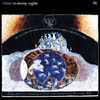 There's no denying that Ghost was the highlight of 2006's Terrastock festival. While the Japanese ensemble might never make a dent in the minds of the young and hip, amongst the most trustworthy music crowds, they are living legends. This is a group who wants it all—to make fantastic psychedelic pop songs, powerful cinematic anthems, and patient yet intoxicating jazz-rock masterpieces—and there's no reason to deny them.
There's no denying that Ghost was the highlight of 2006's Terrastock festival. While the Japanese ensemble might never make a dent in the minds of the young and hip, amongst the most trustworthy music crowds, they are living legends. This is a group who wants it all—to make fantastic psychedelic pop songs, powerful cinematic anthems, and patient yet intoxicating jazz-rock masterpieces—and there's no reason to deny them.
Ghost introduces a 28 minute epic from the start of In Stormy Nights (track 2 on the CD edition but side A of the 2xLP edition). While Ghost tackle different styles in different songs, their ability to compose great arrangements remains constant: although "Hemicyclic Anthelion" is packed full with multi-talented multi-instrumentalists, never does it feel like they're stomping on each other's feet. The patient evolution and virtuoso instrumentation (double-bass, percussion, loops and effects) echoes other Japanese improvisational jazz-rock legends Taj Mahal Travelers while the use of piano, vibes, and chimes is something fans of Psychic TV's Themes I will gravitate towards. It would be difficult to talk about Ghost without mention of the guitar work of Michio Kurihara, and songs like "Hemicyclic Anthelion" showcase his ability both to rip out some bleeding riffs and to exercise restraint during others moments.
The vocals of acoustic guitarist Masaki Batoh can be heard prominently on songs that unsurprisingly have a strong acoustic guitar presence: the album's opener, "Motherly Bluster," is a captivating double-guitar piece from a fantasy world with flute, malleted drums, and lush strings; while "Water Door Yellow Gate" becomes forceful with the march-like percussion and matching piano and acoustic guitar strums, the evil whine of a blistering guitar, and retro electronic choral synth sample sounds (see old OMD).
Ghost waste no time launching into the faster, more powerful drive of "Gareki No Toshi," where percussionists not only lay down the driving backbone with ballsy tympani-esque drums and piano, but take center stage with another layer of angry drumming. This isn't a passive song to be listened to quietly: it screams to be released at full volume through the speakers. Squelchy vocals, squealing guitar, and buzzing effects color the rest of the tune, which reaches an apex with massive gongs: they break the motion but not the intensity. "Caledonia," an MP3 released early from Drag City, is easily the album's biggest "hit single," or whatever the hit single equivalent is in the world of 2007 independent music where labels give out an MP3 online instead of press 45s to issue to radio and retail. For those who don't believe that the power of this massive undertaking is something to believe in, just get the entire MP3 from Drag City for proof. "Caledonia" is the song where everything comes together: flutes and other wind instruments play pied piper with a band that is perfectly in sync with itself, charging forward with the force of a fleet of medieval battleships making their way through a rough sea without any sign of weakness.
Things calm back down for the beautiful string, acoustic, and vocal ending of "Grisaille," and LP customers get a bonus treat of another version (the Sing Together mix) of "Caledonia." Three years ago I was championing Hypnotic Underworld as the year's first masterpiece and I can safely stand by that claim for In Stormy Nights. As the group gets better I feel in terms of ability and arrangements, I'm sad to face the possibility that their live days might actually be numbered. While I look forward to a day where I can witness Ghost live again, from the way their performance at Terrastock was billed, it isn't like that such an event will happen. At least there's no visible end in sight for the great music they continue to issue.
samples:
Read More
- Scott Mckeating
- Albums and Singles
Listening to this latest Joe+N release it seems like he's nonchalantly clawing himself one step closer to creating a definitive slice of starveling musicality. The production sound and improvised song structures on this CDR have all the hallmarks of effortless one-takes that couldn't be faked without a bank of bespectacled major label engineers.
This a.k.a. for Carbon Records head Joe Tunis sees him building an open-minded nonchalance of meat stripped bones music over these five tracks. Opening with a fumbling static buzz and a vocal refrain that sounds like it is blown through a card tube or broken horn, there’s a sense of dub production styled lost and found in the disappearing sounds. Hopefully there’s an elongated take somewhere in the First Person vaults, as this feels a little too much like a clipped short intro when placed up against the other tracks relative structures.
The following song, a lo-fidelity zero-rent piece of malnourished one man and his guitar work, manages to spread its wings despite the self-hammered clubbed feet. The mostly steady playing supports a fumbling vocal, but as it devolves further it only gets better. The third untitled piece sees more of what could possibly be quite unhygienic vocal machinations coated in spoken word mucus and jerky chimes. Further songs see things come a little more into focus with a distant kismet ruined guitar slugging it out with a sine-melted vocal line. The dissimilar elements of the bass and treble ends continue to bleed steadily all over the song's middle, pushing it further than the average jam. Even with this CDR's fumbles and very real air of confused improvised emptiness there is a musical core to all the pieces.
Read More
- Gary Suarez
- Albums and Singles
Read More
- Administrator
- Albums and Singles
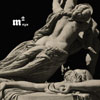 Despite my love for demented junglist Panacea, I didn't start out as a Squaremeter fan. In fact, I downright detested Mathis Mootz's first album with that moniker. Perhaps the worst release in Ant-Zen's peerless catalog, 14id1610s was inexcusably self-indulgent: a poorly executed collection of irreverent accidents reeking of puerile amateurism.
Despite my love for demented junglist Panacea, I didn't start out as a Squaremeter fan. In fact, I downright detested Mathis Mootz's first album with that moniker. Perhaps the worst release in Ant-Zen's peerless catalog, 14id1610s was inexcusably self-indulgent: a poorly executed collection of irreverent accidents reeking of puerile amateurism.
samples:
Read More
- Administrator
- Albums and Singles
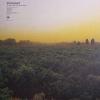 Another Stephen O'Malley musical project is released on yet another limited edition: this time a one-sided and etched LP. Although Crashed Like Wretched Moth does not grab me like the previous Ginnungagap releases, it does not have the same immediate power. It seems to be slowly growing on me but I doubt I will be able to embrace it as heartily as his other side project releases.
Another Stephen O'Malley musical project is released on yet another limited edition: this time a one-sided and etched LP. Although Crashed Like Wretched Moth does not grab me like the previous Ginnungagap releases, it does not have the same immediate power. It seems to be slowly growing on me but I doubt I will be able to embrace it as heartily as his other side project releases.
Conspiracy Records
After such a nice sleeve (very much indebted to many releases on Touch) I was expecting more from the etching, a crude demon type creature and a lot of bat-like beings in silver ink. The piece takes up a full side, so it is around 20 minutes long. Unlike most O'Malley work, there are absolutely no guitars nor any instruments remotely related to the guitar. Instead, Crashed Like Wretched Moth is O’Malley in front of a piano and clattering out a constant din.
Like other Ginnungagap releases, the sound of the music is atypical of what would normally be expected from a man who is renowned for massive stacks of amps and bending reality itself with volume. Here the bulk of the music is a thunderous piano motif, constantly vibrating for the length of the piece. For a while, this is all there is to Crashed Like Wretched Moth and I was starting to think I had wasted my money but soon new sounds and notes appeared. Plucked piano strings and pounded keys stab out of the recording like a blind knife fighter. Sometimes O'Malley hits home sharply, sometimes the effect is dulled.
Crashed Like Wretched Moth is a bit of a disappointment after the frankly perfect Remeindre. However, it is obvious that Ginnungagap is a way for O’Malley to explore new musical vistas and to simply rehash what he has done before would be futile. Also, it would be unfair to dismiss this as a failed experiment, the piece is in no way awful but it does not sit right with me at this point in time. With each spin of the record I enjoy it a little more but I don't know if in the long run I will come back to Crashed Like Wretched Moth as often as other works in O’Malley’s cannon.
This is only available on LP so no mp3 samples, apologies!
Read More
- Administrator
- Albums and Singles
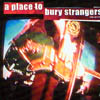 Three-piece bands like this aren't supposed to exist anymore. Typically a keyboardist, an extra guitar player, and someone able to manipulate a laptop or some drum machines would be necessary to do what this band does with one guitar, one bass, and one drum set. Their intensity is propelled in equal portions by brutally distorted guitar work, driving bass lines, pounding drums, and simple, effective song writing.
Three-piece bands like this aren't supposed to exist anymore. Typically a keyboardist, an extra guitar player, and someone able to manipulate a laptop or some drum machines would be necessary to do what this band does with one guitar, one bass, and one drum set. Their intensity is propelled in equal portions by brutally distorted guitar work, driving bass lines, pounding drums, and simple, effective song writing. These EPs are, at their essence, the image of rock 'n' roll turned inside out: all the ugly viscera spilling out in an excess of anger, ghostly melodies, and crushing noise.
The opening song on the "Red" EP proclaims, "I'll never fall in love again." What follows is a wall of noise and music that alleviates as much as it destroys. The guitars sound like explosions, the bass lines like consecutive gut punches, the percussion ragged and dirty with cuts and bruises. A Place to Bury Strangers are fucking heavy, their sound packed to the brim with every kind of sound imaginable. Oliver Ackermann's guitar sounds like an apocalyptic trumpet at times, honking out wholly alien tones along with a shimmering buzz or a cacophonous crunch worthy of nightmares. When he isn't busy ripping the strings and insides out of his guitar, Ackermann is capable of keeping his instrument within the realms of the intelligible: at least sometimes it sounds like a string instrument. Running along the side of this affinity for electric carnage is a talent for song writing. Every one of these songs has a memorable hook packed inside them with unconventional and surprising moments that make the songs absorbing from beginning to end. "The Falling Sun" functions on soaring melodies that play themselves out over each other, the bass, the noise, and the guitar melodies all competing for space in the mix, all of them continually building the tension in the song until the whole beautiful mess galvanizes itself and turns to dust. On the other hand, "Don't Think Lover" comes out swinging with a tornado of effects and unrelenting drums before caving into a more conventional pop tune. The peace isn't too last, though, as a brief silence in the song is followed by an overpowering and wordless chorus of sorts that hits even harder than the opening punch of sound.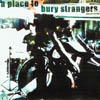 The "Green" EP begins with the anthemic "Never Going Down," a song that is part tribal drumming and part "I'm going to rip your legs off your body" guitar assault. The songs on this EP sound slightly more open, less washed out in effects and more immediate. If the "Red" EP is a bit dreamy despite all its immediacy, the majority of the "Green" EP is akin to having a piano dropped on your head when you least expect it. It starts off strong and doesn't even think about relenting until the final song, "Ocean," which is powerful in its own right, though not as heavy as tracks like "My Weakness" or "To Fix the Gash in Your Head." Both of these tunes sound like they were made for a car crash, "My Weakness" has an especially virulent drum line that holds up an accelerated guitar part and a heavy, throbbing bass guitar that holds the song together with its melody and throbbing rhythm. Not to back down for even a second, "To Fix in the Gash in Your Head" is perhaps the bands catchiest tune despite its manic pace and nasty lyrics. "I'll just wait for you to turn around and kick your head in" is delivered in a near deadpan voice, betraying the idea that this might be a sarcastic tune: with the flying, completely sizzling melody that dominates the tune and the machine gun percussion, it's hard to believe that this song is anything but dead serious. The "Green" EP ends with "Ocean," a song whose title completely relates its contents. Filled with washes of noise and a floating, dense melody, it is the perfect end to an EP that feels complete unto itself, as if each of the songs had been written for each other.
The "Green" EP begins with the anthemic "Never Going Down," a song that is part tribal drumming and part "I'm going to rip your legs off your body" guitar assault. The songs on this EP sound slightly more open, less washed out in effects and more immediate. If the "Red" EP is a bit dreamy despite all its immediacy, the majority of the "Green" EP is akin to having a piano dropped on your head when you least expect it. It starts off strong and doesn't even think about relenting until the final song, "Ocean," which is powerful in its own right, though not as heavy as tracks like "My Weakness" or "To Fix the Gash in Your Head." Both of these tunes sound like they were made for a car crash, "My Weakness" has an especially virulent drum line that holds up an accelerated guitar part and a heavy, throbbing bass guitar that holds the song together with its melody and throbbing rhythm. Not to back down for even a second, "To Fix in the Gash in Your Head" is perhaps the bands catchiest tune despite its manic pace and nasty lyrics. "I'll just wait for you to turn around and kick your head in" is delivered in a near deadpan voice, betraying the idea that this might be a sarcastic tune: with the flying, completely sizzling melody that dominates the tune and the machine gun percussion, it's hard to believe that this song is anything but dead serious. The "Green" EP ends with "Ocean," a song whose title completely relates its contents. Filled with washes of noise and a floating, dense melody, it is the perfect end to an EP that feels complete unto itself, as if each of the songs had been written for each other.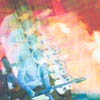 On their third and most recent EP the band almost completely shifts gears. The music is far more subdued than either of the previous EPs and the emphasis on pure aural assault is toned down for a bit. In a way the track "Half Awake" dominates 18 and a half minute running time, tumbling along in waves of loose strings and wavering effects. It also stands out as being completely instrumental, many of the effects on the guitars sounding like keyboards and drifting easily through the steady pulse of drums. A "portastudio demo" of "Missing You" is included, fitting in well because it is far more stripped down, the trilled bass and delayed effects calming down the energy that the "Red" EP version has. Closing things out is a cover of The Jesus and Mary Chain's "Just Out of Reach" from the Barbed Wire Kisses compilation. It's a good cover, but more than that, it really sets this band apart from any of their influences, demonstrating in no uncertain terms that A Place to Bury Strangers are working on their own agenda, no matter who's influenced them.
On their third and most recent EP the band almost completely shifts gears. The music is far more subdued than either of the previous EPs and the emphasis on pure aural assault is toned down for a bit. In a way the track "Half Awake" dominates 18 and a half minute running time, tumbling along in waves of loose strings and wavering effects. It also stands out as being completely instrumental, many of the effects on the guitars sounding like keyboards and drifting easily through the steady pulse of drums. A "portastudio demo" of "Missing You" is included, fitting in well because it is far more stripped down, the trilled bass and delayed effects calming down the energy that the "Red" EP version has. Closing things out is a cover of The Jesus and Mary Chain's "Just Out of Reach" from the Barbed Wire Kisses compilation. It's a good cover, but more than that, it really sets this band apart from any of their influences, demonstrating in no uncertain terms that A Place to Bury Strangers are working on their own agenda, no matter who's influenced them.
samples:
- Don't Think Lover ("Red" EP)
- My Weakness ("Green" EP)
- Breathe ("Third" EP)
Read More
- Administrator
- Albums and Singles
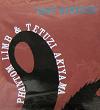 This meeting between New York's Phantom Limb and Tokyo's Tetuzi Akiyama is electric. At just over half an hour it is all too short but the music on this disc is impeccable. The playing is inventive, abstract and full of energy. While far from perfect, I enjoyed it immensely. Phantom Limb and Akiyama do not employ flashy, over-the-top techniques but build on solid grooves and noise to make compelling music.
This meeting between New York's Phantom Limb and Tokyo's Tetuzi Akiyama is electric. At just over half an hour it is all too short but the music on this disc is impeccable. The playing is inventive, abstract and full of energy. While far from perfect, I enjoyed it immensely. Phantom Limb and Akiyama do not employ flashy, over-the-top techniques but build on solid grooves and noise to make compelling music.
Archive
The piece begins with some uncomfortably pitched drones accompanied by ominous thuds and bursts of distorted guitar. It seems like the sound is spinning around my head and occasionally dive-bombing through my skull. Before it feels like my ears have taken all they can, Hot Ginger morphs into a soothing barrage of gentle noise. This is noise in the musical sense as opposed to the Merzbow sense. It reminds me of that fuzzy, warm glow that comes out of the speakers when I listen to My Bloody Valentine's Loveless. This is a lot more harsh despite the openness of the piece when it gets into full swing. A menacing undercurrent runs through the performance and the tension builds and builds but never breaks. It makes the piece more gripping as I am on edge waiting for the inevitable crash which incidentally never comes.
Eventually the piece peters out into a glistening drone which is soothing after the force of the preceding 20 minutes. The menace soon returns, bringing with it harsh feedback and some fucked up sounding organ sounds. This is not the strongest part of the piece, I would prefer if the wall of sound from before had kept going for longer. Still, Hot Ginger regains its momentum after a few minutes meandering and finishes satisfactorily with the guitars buzzing and throbbing through the mix. One player keeps using the cut-off switch on his guitar to great effect; he gets a great tone off it. The other guitarist builds up a strong rhythm with the two organs. All the players eventually slow down, allowing the piece to ebb to a stop beautifully.
There is not much information in the sleeve but I assume this is an improvisation given the performers involved, it certainly sounds like it was plucked from the ether. The sleeve is gorgeous—as usual with this label—a terracotta-colored card silkscreened with marvellous imagery. It gives no indication what the music on the disc will sound like but when listening to Hot Ginger it all makes some sort of sense (what sort of sense I have not decided yet).
Hot Ginger is sometimes great, sometimes not. Luckily the greatness far outweighs any of the less enjoyable parts. The simplicity of the playing allows the elegance of the music to shine through. They could have put a little more oomph into some of the performance but on the whole Hot Ginger is excellent. Really, my main gripe is not that there are too many bad points but it could do with even more great points.
samples:
Read More
- Administrator
- Albums and Singles
 Project Perfect, long lost duo consisting of Andy Brown (Jessamine/Fontanelle/Southerning) and guitarist Charlie Smyth (Fontanelle) sees their entire oeuvre re-released on Community Library this month.
Project Perfect, long lost duo consisting of Andy Brown (Jessamine/Fontanelle/Southerning) and guitarist Charlie Smyth (Fontanelle) sees their entire oeuvre re-released on Community Library this month.
Originally issued locally by a conceptual arts group, the CD never quite made it out of Portland to deserved acclaim. 5 years later, the music has become even more relevant in its combination of minimal analogue grit, dark jazz haze, and marriage of free improvisation to electronic production. Much more than a Fontanelle side project, Project Perfect's recordings capture the early 00's spirit of Portland's musical experimentalism- uncompromising, musical, and uncategorisable.
Read More
- Administrator
- Albums and Singles
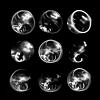 Unlike most composers working with electronics, Teague does not use them as his primary instruments or as part of difficult, academic studies. Instead he composes straightforward scores for ordinary orchestras and includes electronics like any regular composer would include other traditional instruments. For most of the pieces, the electronics take the back seat and are used only to embellish the piece like any other instrument. The end result is a nice but fairly uneventful album.
Unlike most composers working with electronics, Teague does not use them as his primary instruments or as part of difficult, academic studies. Instead he composes straightforward scores for ordinary orchestras and includes electronics like any regular composer would include other traditional instruments. For most of the pieces, the electronics take the back seat and are used only to embellish the piece like any other instrument. The end result is a nice but fairly uneventful album.
Type
All of the pieces are recorded beautifully; Teague makes pleasant, subtle use of dynamics and the album is rich in sound so from that aspect it is a treat for the ears. However, many of the pieces are too much on the schmaltzy Holywood score side of things for me to fully engage with. It's not bad but not particularly interesting. The opening piece, "Introit," is reminiscent of Ennio Morricone's score for The Mission but Teague does not demonstrate the gentle power of Morricone's work. That is not to say that Teague has no power but he is reserved for my tastes. Many of the pieces like "Nephesch" and the two "Tableau" pieces would be run of the mill scores were it not for a few beats or synths on top. The former starts to come into its own towards the end but it is too late in the game for the piece to be fully redeemed. The "Tableau" pieces could be any Danny Elfman soundtrack that has been slightly scratched.
There are a couple of pieces on Coins & Crosses that engaged me. "Accidia" is where Teague makes best use of electronics. After an almost stereotypic orchestral start, synthesisers overwhelm the piece for a short while before the both elements fuse together to sound like a broken music box. It is lovely stuff to say the least. "Fantasia for Strings" (which features no electronics) is a straightforward orchestral composition and is an enjoyable if unoriginal piece. There is no aural signature here for the piece to be identified as a work of Teague's; it could be anyone. That being said, it is pleasant to listen to and is one of the only pieces on the record that works as a piece of music in its own right, the rest of them feel like they are missing something integral.
I feel that Teague could make some nice soundtracks that would work well provided there is a suitable context. As pieces of music on their own, there is not a lot here to set him apart from any working composer. I do not mean to harp on about it all sounding like a soundtrack but many of the pieces have this huge void in them like there is meant to be something accompanying the music. I would be interested to see where he goes from here, there is potential but I feel Teague slightly missed the mark on Coins & Crosses.
samples:
Read More
- Administrator
- Albums and Singles
 For all their brooding, muffled fatalism and urgent, agile glamour, Josef K's smartest feature may have been their gleeful determination to shun cliché. They always sounded less destined for hit than myth, and despite not being an unqualified success, this compilation reveals that -at best- their juxtaposition of joy and grimness remains cathartic.
For all their brooding, muffled fatalism and urgent, agile glamour, Josef K's smartest feature may have been their gleeful determination to shun cliché. They always sounded less destined for hit than myth, and despite not being an unqualified success, this compilation reveals that -at best- their juxtaposition of joy and grimness remains cathartic.
Josef K aren't unique in defying an easily coined description of their essence. Umberto Eco once wrote something to the effect that popular music was on a path to such monotony that eventually the slightest nuance would seem like a musical feast. It's doubtful he heard Josef K, but if they were a coin, then a romantic, amateur dynamic would be heads and a wry manifestation of Eco's opinion would be tails. At times they sported an unadorned melancholy, at others a resplendent, wired, quasi-funk-by-numbers. Their dialectic infused alienated seriousness with tongue-in-cheek fun; as if they surfed on effluent, crossed Hoy in brown suede shoes, and waltzed through fog in sunglasses.
Whether or not they were the blueprint for future small labels, Postcard put out some lovely records. Their beautifully packaged singles proclaimed "The Sound of Young Scotland," yet always felt like the creation of a cottage industry. Both the handwriting-style script and the design of a be-kilted sword-dancing lad imitated an amusing incongruity best executed by that well known snood fancier, Glen Baxter. It bugs me then that the cover of Entomology goes instead for a somewhat heavy-handed allusion to Franz Kafka, perhaps because, despite the name, Josef K never sounded that obvious. On the contrary, they sounded as if they inhabited a corridor of uncertainty; confident as thieves, elusive as youthful exuberance, scratchy, spiraling, hypnotic, groovy, confused, literate, lonely, happily in the shadows. I may be dumb, but the passage of time hasn't erased all the mystery from their lyrics, which still hang like narrative snippets of overheard dialogue.
When listening to Gordon McIntyre from Ballboy & Money Can't Buy Music, at times the late Billy Mackenzie, sometimes even Edwyn Collins, it seems entirely reasonable to demand that every band get a Scottish singer; to insist on the suggestion of the mournful, the wry phrasing as effortless as cold-breath, the thistle-sharp wit and warm-as-Talisker brogue. Paul Haig's voice sometimes skims as gracefully as a pebble across the water. On the magnificent "Chance Meeting," his disconcerting croon holds both the swooning nostalgia of Ferry and the cranked deja vu of Devoto. Malcolm Ross's guitar as scalpel approach is as well-suited to the spunky discord as to the doomed romance. If the past is a foreign country, Josef K are welcome time-travelers, bringing a wealth of hopeless, languid, tension and bags of tragic, restrained, contradictory fun. I prefer the truly exquisite singles, but there's plenty to enjoy from across their fleeting existence. They originally sounded like they existed in the past tense and a quarter of a century hasn't altered those images. In a sense, the deja vu is now double. Anyone wanting more: LTM have a good history of Josef K and many other neglected artists on their roster. As for the grandiose notion of their legacy? It's kinda funny...
samples:
Read More

